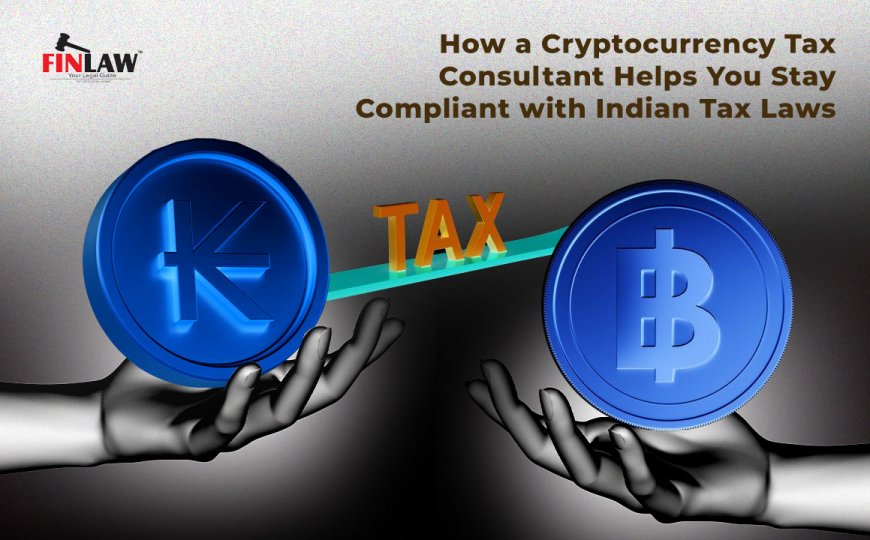How a Cryptocurrency Tax Consultant Helps You Stay Compliant with Indian Tax Laws
Hiring a cryptocurrency tax consultant helps Indian investors navigate VDA rules, file accurate ITRs, claim credits, and avoid penalties.

Introduction
Cryptocurrency has rapidly gained popularity in India as an alternative investment, but the Indian government has made it clear that all digital assets are subject to taxation. Cryptos, NFTs, and other virtual tokens are categorized as Virtual Digital Assets (VDAs) under Indian tax law. While this recognition brings legitimacy, it also brings compliance challenges.
The rules for reporting crypto gains, calculating taxes, and reconciling 1% TDS (Tax Deducted at Source) can be complex and confusing for most investors. That’s why consulting a cryptocurrency tax consultant has become increasingly essential for anyone investing or trading in digital assets in India. A professional consultant helps ensure accurate reporting, mitigates legal risks, and even aids in planning your investments tax-efficiently.
Understanding Cryptocurrency Taxation in India
To fully appreciate the value of a consultant, it’s important to understand the taxation landscape for VDAs:
Key Provisions
-
Flat 30% Tax on Gains
The Finance Act, 2022 introduced Section 115BBH, under which income from the transfer of VDAs is taxed at a flat 30%, regardless of whether the transaction is treated as capital gains or business income. This rate is significantly higher than standard long-term capital gains tax on equities (10%), making compliance and accurate reporting critical.
-
Limited Deductions and Set-offs
Most conventional tax deductions, like Chapter VI-A deductions or indexation benefits, are not available for VDAs. Losses from crypto cannot be set off against income from other sources like salary, business, or property. Only the cost of acquisition can be considered for calculating gains.
-
1% TDS on Transfers
Under Section 194S, a 1% TDS applies to payments made for the transfer of VDAs above a certain threshold. The TDS is generally deducted by exchanges but must also be reconciled by the taxpayer while filing their ITR.
-
Mandatory Disclosure: Schedule VDA
The Income Tax Department has made it mandatory to report all VDA transactions in Schedule VDA. Failure to disclose correctly may lead to defective returns, penalties, and even scrutiny or audits.
Why Crypto Tax Compliance is Challenging
Unlike traditional investments, cryptocurrency transactions have unique complexities:
-
Multiple Platforms and Wallets: Traders often use several exchanges and wallets, each with different reporting formats.
-
Crypto-to-Crypto Swaps: Every exchange between cryptocurrencies is treated as a taxable event, requiring precise INR valuation at the time of the swap.
-
Special Events: Staking rewards, airdrops, forks, and mining are treated differently for taxation purposes. Timing of recognition can significantly affect tax liability.
-
Cross-Border Transactions: Investments on foreign exchanges may require compliance with foreign asset reporting rules and even create additional tax obligations.
-
Reconciliation Issues: TDS deducted by exchanges may not align with the Income Tax Department records, making reconciliation a tedious process.
All these factors make manual calculation error-prone, increasing the risk of penalties and scrutiny.
How a Cryptocurrency Tax Consultant Helps You
Hiring a cryptocurrency tax consultant is more than just a convenience; it’s a strategic investment. Here’s how they add value:
1. Comprehensive Transaction Data Consolidation
Consultants collect transaction history from multiple sources — exchanges, wallets, and spreadsheets — and convert them into INR-based ledgers for each trade. They ensure the data is ready for tax filing, which is particularly valuable for traders with hundreds or thousands of transactions.
2. Accurate Classification of Income
Not every crypto transaction is taxed the same way. A consultant determines whether an event is:
-
Capital gains: Long-term or short-term
-
Business income: Frequent trading treated as professional income
-
Other sources: Airdrops, mining rewards, staking
Correct classification ensures that your tax liability is calculated precisely and reduces the risk of disputes with the tax department.
3. Correct Tax Calculation and TDS Reconciliation
The consultant applies Section 115BBH and Section 194S rules, calculates your taxable gains, and reconciles any 1% TDS deducted across exchanges. This step prevents overpayment and ensures you claim rightful credits.
4. Filing Schedule VDA and ITR
Completing Schedule VDA accurately is crucial. A consultant ensures that every transaction is reported correctly, avoiding defective returns and potential penalties.
5. Strategic Record-Keeping and Tax Planning
Even with limited deductions, careful record-keeping and timing of disposals can prevent mistakes and reduce unnecessary tax payments. Consultants provide templates, ledgers, and workflows to maintain clean records.
6. Handling Notices, Audits, and Assessments
If you receive a notice from the Income Tax Department, a consultant drafts a professional response and can represent you, mitigating risks and penalties. With crypto transactions now a focus for ITD audits, this service is increasingly critical.
7. Support for NRIs and International Investors
Non-resident Indians (NRIs) and residents trading on foreign platforms require guidance on foreign asset disclosure, double taxation avoidance, and reporting under Schedule FA. Consultants ensure all rules are adhered to while minimizing tax exposure.
Real-World Examples
-
Frequent Trader Scenario: A trader executing BTC → ETH → INR trades across multiple exchanges risks misreporting gains. A consultant reconciles INR values at each trade timestamp, preventing errors and double taxation.
-
Staking and Airdrops: Airdrops received during blockchain forks can be taxed as income on receipt or on sale. Consultants determine the correct treatment and report it accurately.
-
TDS Credit Mismatch: 1% TDS deducted by multiple exchanges can create confusion. Consultants reconcile these amounts to ensure proper credit is claimed.
-
Income-Tax Notices: If ITD raises queries about undisclosed gains, consultants prepare evidence-backed responses, negotiate timelines, and mitigate penalties.
Choosing the Right Cryptocurrency Tax Consultant in India
Selecting the right professional is crucial. Look for:
-
Specialized Experience: Prefer Chartered Accountants (CAs) or tax lawyers with proven expertise in cryptocurrency taxation.
-
Technology-Driven Approach: Use of crypto tax software or custom tools to reconcile thousands of trades efficiently.
-
Up-to-Date Knowledge: Awareness of CBDT circulars, Finance Acts, and ITD notices related to crypto.
-
Transparent Fee Structure: Fees may be per wallet, per exchange, or flat monthly; ensure they are aligned with your transaction volume.
-
Compliance-Oriented: Avoid aggressive tax-saving schemes; focus on accurate disclosure and legal compliance.
-
Track Record: Client testimonials or case studies showing successful audits, notice handling, or accurate filings.
DIY vs. Consultant: Evaluating Risk
For casual investors with a few transactions annually, DIY may be manageable. But if you are:
-
A frequent trader
-
Using multiple exchanges
-
Receiving airdrops, staking, or mining income
-
Facing scrutiny or notices
Hiring a cryptocurrency tax consultant is strongly recommended. India’s Income Tax Department is increasingly leveraging AI, analytics, and third-party data to detect unreported crypto gains. Professional guidance is not just helpful; it’s a safeguard.
Compliance Checklist for Crypto Investors
-
Export transaction histories from all wallets and exchanges.
-
Convert each transaction into INR using official exchange rates.
-
Reconcile 1% TDS in Form 26AS with your exchange statements.
-
Keep detailed records for at least 7 years.
-
Report all VDA transactions in Schedule VDA of your ITR.
-
Consult a professional before making large disposals or responding to notices.
Common FAQs
Q: Are all crypto gains taxed at 30%?
Yes, Section 115BBH mandates a flat 30% tax on all gains from transfer of VDAs.
Q: Can crypto losses be offset against salary or other income?
No. Losses from VDAs cannot be set off against other heads of income.
Q: Who is responsible for 1% TDS?
The person or exchange paying for the transfer of VDA must deduct 1% TDS under Section 194S.
Additional Benefits of a Cryptocurrency Tax Consultant
-
Peace of Mind: Knowing your filings are accurate reduces stress and saves time.
-
Audit-Ready Records: Consultants create documentation that stands up to ITD scrutiny.
-
Optimization of Investment Strategy: While deductions are limited, consultants help with strategic timing and record-keeping.
-
Assistance in Dispute Resolution: Representation in case of notices or audits reduces exposure to penalties and interest.
Conclusion
The Indian government’s approach to cryptocurrency taxation is strict and increasingly enforced. With a flat 30% tax, mandatory TDS, and limited deductions, reporting inaccuracies can lead to notices, penalties, and unnecessary interest payments.
A cryptocurrency tax consultant provides the expertise, technology, and strategic guidance necessary to navigate this complex landscape. They ensure compliance, optimize tax treatment where possible, and provide critical support if disputes arise. In today’s crypto-driven world, hiring a consultant is not just a smart choice—it is essential for protecting your financial and legal interests.
What's Your Reaction?



















